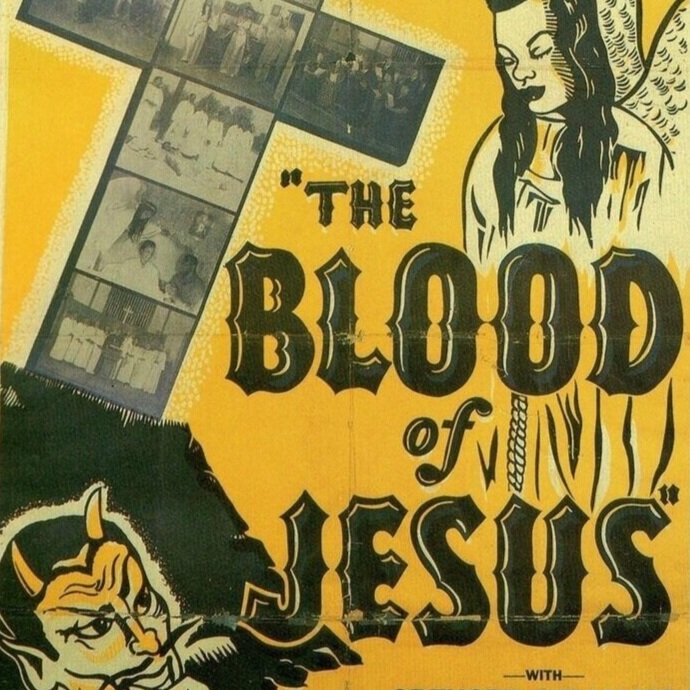
The Blood of Jesus
with an introduction by Cynthia Henderson
The Blood of Jesus explores vital cultural issues, from the importance of Christianity and family values to the longstanding question of a virtuous rural life versus sinful urban living. A moving portrait of black spiritualism and folk beliefs, it incorporated some outstanding gospel music by Reverend R. L. Robinson’s aptly-named Heavenly Choir.
Plot
Martha Ann and Razz Jackson are a loving couple. But while Martha Ann is deeply religious, Razz is not. In fact, he finds every opportunity to avoid the church services that his wife so dutifully attends. The spiritual crisis that results is intensified by Razz’s accidental shooting of Martha Ann, which brings her to the point of death and begins the battle for her soul. An Angel appears and encourages her to take a heavenly path; but Satan, in concert with a tempter named Judas, tries to lead her in a different direction.
Significance in Race Film History
Spencer Williams (1893-1969), best known for his role as Andy in the controversial 1950s television sitcom The Amos ’n’ Andy Show, was a pioneering African-American producer, director, sound technician, and actor. He began his entertainment career as a teenager, worked as a call boy for Oscar Hammerstein, and learned comedy from the renowned vaudevillian Bert Williams. After serving in World War One, Williams moved west to California, where he gained acting experience and became a Hollywood veteran. He also founded his own movie and newsreel company, Lincoln Talking Pictures Company. Over the years, he was associated with a number of directors, including Al Christie, the producer of popular racist comedies like Melancholy Dame, on which Williams worked. Williams also enjoyed a long association with Alfred N. Sack, for whom he wrote several screenplays, including one for the race Western Harlem Rides the Range and another for The Son of Ingagi (1940), which is now considered the first race horror film (and which he based on his own short story “House of Horror”).
In 1940, Williams was given the opportunity by Sack not just to write but also to direct The Blood of Jesus (released in 1941). That religious morality drama, filmed in Texas on a budget of $5,000, made a real impact in the race film market. Its story was poignant: a married couple, Martha Ann and Razz Jackson, experiences a spiritual crisis that is intensified by Razz’s accidental shooting of his wife, who comes perilously close to death.
Although Williams’ rough-hewn style, like that of Oscar Micheaux, was lacking in technical sophistication, the film itself was impressive in numerous ways. Innovative in the prominence it gave to its female characters (especially to Martha) and in its symbolism and its special effects (such as the angel who visits Martha as she nears death and who watches over her as she chooses which “highway” to travel), it explored vital cultural issues, from the importance of Christianity and family values to the longstanding question of a virtuous rural life versus sinful urban living. A moving portrait of black spiritualism and folk beliefs, it incorporated some outstanding gospel music by Reverend R. L. Robinson’s aptly-named Heavenly Choir.
Presumed lost, The Blood of Jesus was rediscovered in a Texas warehouse in the mid-1980s. Given its cultural and cinematic significance, it was the first race film to be added to the U.S. National Film Registry at the Library of Congress. Williams went on to write, direct, and act in numerous films and is now hailed as an early and important race film actor and television star.
- Barbara Tepa Lupack
“The fact that The Blood of Jesus was one of the few all-black (written, produced, directed, performed) films in a time when Hollywood used black actors primarily as maids, drivers, other types of service persons, infantilized comedic devices, etc. gives this work…a great deal of significance.”
— Cynthia Henderson
PROGRAM LECTURER
Cynthia Henderson
“Spencer Williams’ The Blood of Jesus”
Cynthia Henderson is a Professor of Acting in the Department of Theatre Arts at Ithaca College in Ithaca, New York. She has directed and performed professionally on stage and on television throughout the U.S. and in Europe, China, Mexico, and Cameroon. She is the founder and director of Performing Arts for Social Change (pa4sc.com), a program that uses theater as a venue to give voice to often silenced societal issues involving marginalized people in the U.S. as well as internationally. She is the author of The Actor’s Landscape (available on Amazon), a member of the National Alliance of Acting Teachers and Actors’ Equity Association, and also a recipient of three Fulbright awards.
Film Credits
Director: Spencer Williams.
Writing credits: Spencer Williams, Langston Hughes (uncredited poem).
Cast: Cathryn Caviness (Sister Martha Ann Jackson), Spencer Williams (Razz Jackson), Juanita Riley (Sister Jenkins), Reather Hardeman (Sister Ellerby), Rogenia Goldthwaite (The Angel), James B. Jones (Satan), Frank H. McClennan (Judas Green), Eddie DeBase (Rufus Brown), Alva Fuller (Luke Williams), R. L. Robertson (Reverend R. L. Robertson), The Heavenly Choir (Group Singers).
Producers: Spencer William (producer, credited), Alfred N. Sack (executive producer, uncredited).












